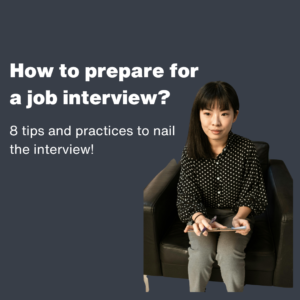That’s the most common interview question that typically kicks off every interview. Many candidates get very excited about giving a summary of their lives and do not realise that they are approaching the answer in the wrong way. It’s important to understand what hiring managers or recruiters are looking for in your answer. This question serves as an opportunity for you to provide a concise and compelling overview of your professional background and relevant experiences or to highlight why you will perfectly fit the company’s culture. Get it right and prepare to answer it in the best way possible.
What Hiring Managers or Recruiters Want to Hear
Keep in mind that hiring managers or recruiters are interested in understanding your suitability for the role and how your skills and experiences align with the job requirements. They want to assess your communication skills, confidence, and ability to articulate your career trajectory effectively. It is not required, nor expected to go through every job you have on your CV or to explain your personal life.
Dos and Don’ts
Dos
- Prepare a concise and focused response: In most cases, I would begin by providing a brief summary of your professional background, qualifications, and side projects. Focus on relevant experiences and achievements that directly relate to the position you are applying for. Example: “I have over five years of experience in project management, leading cross-functional teams and successfully delivering complex projects on time and within budget.” Keep it concise.
- Highlight key strengths and skills: Emphasize the skills and qualities that make you a strong candidate for the role. Discuss specific examples that demonstrate your abilities and achievements. You need to prepare for this by studying the job description and understanding how you will bring value to this new position. Example: “I excel in stakeholder management and have a proven track record of building strong relationships with clients, resulting in a 20% increase in customer satisfaction.”
- Connect your experiences to the role: Demonstrate how your past experiences align with the requirements of the position. Showcase your knowledge of the company and explain why you are excited about the opportunity. Example: “Having worked in the software industry for several years, I have a deep understanding of agile methodologies and have successfully implemented them to streamline development processes, which I believe would greatly benefit your organization.”
Don’ts
- Avoid providing personal information: While it’s important to establish rapport, avoid sharing personal details that are unrelated to your professional qualifications, the role or the company culture. Be authentic and yourself, but I do not recommend starting the first interaction with oversharing. Use this limited time to explain why you are the best candidate. Bad Example: “I have two kids and love Indian food.”
- Don’t recite your entire resume: Avoid listing every job or achievement on your resume. Instead, focus on highlighting the most relevant experiences and skills. Keep it relevant and engaging. Bad Example: “I started my career as an intern, then worked as a junior analyst, and later became a team lead…”
- Avoid vague or generic statements: Provide specific and concrete examples to support your claims. Avoid using buzzwords or generic statements that lack substance. Before the interview, brainstorm your achievements and think about how to incorporate them into your answers. Bad Example: “I am a highly motivated and detail-oriented individual with excellent communication skills.”
Remember to practice your response beforehand and tailor it to each specific job opportunity and you will certainly leave a positive impression on the interviewer. Good luck with your interviews!



